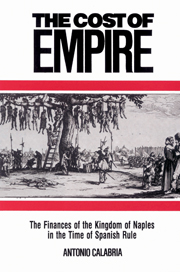Book contents
- Frontmatter
- Contents
- List of figures
- Acknowledgments
- List of abbreviations
- Weights and measures
- Monetary units and exchange rates
- Maps
- Introduction
- 1 The early modern Southern Italian economy
- 2 The fiscal system in early modern Naples
- 3 Government income, 1550–1638
- 4 Government expense, 1550–1638
- 5 The creation of a securities market in the later sixteenth century
- Conclusion
- Appendix I The tables
- Appendix II The sources
- Bibliography
- Index
- Cambridge Studies in Early Modern History
2 - The fiscal system in early modern Naples
Published online by Cambridge University Press: 13 November 2009
- Frontmatter
- Contents
- List of figures
- Acknowledgments
- List of abbreviations
- Weights and measures
- Monetary units and exchange rates
- Maps
- Introduction
- 1 The early modern Southern Italian economy
- 2 The fiscal system in early modern Naples
- 3 Government income, 1550–1638
- 4 Government expense, 1550–1638
- 5 The creation of a securities market in the later sixteenth century
- Conclusion
- Appendix I The tables
- Appendix II The sources
- Bibliography
- Index
- Cambridge Studies in Early Modern History
Summary
The passage of Naples from Aragonese to direct Spanish rule in 1504 brought no more immediate changes in the structure of the fiscal system or in the intensity of fiscal pressure than it did alterations in the political or representative system of the Kingdom. Even the early years of Emperor Charles V's reign were marked by no substantial innovations. The weight of taxation remained as it had been, more or less constant, since the reforms started by Alfonso the Great, in 1444, and the retention of Don Ramón de Cardona as Viceroy until his death in 1522 attested to the sovereign's respect for the privileges and traditions of his newly-acquired realm.
Yet the period bounded by the consolidation of Spanish power in Italy and the great anti-Spanish revolts of Sicily and Naples in the 1640s did see profound changes in fiscal life in the Kingdom. Those changes were most clearly felt in a significant and sustained growth of fiscal pressure which came to ignore the economic capacities of the Kingdom as it reflected the growing needs of Imperial policy.
Until the devolution of Milan to the Spanish Crown in 1535, the Kingdom was the beachhead of Spanish action in Italy, and the relatively light fiscal pressure it bore reflected its status as a newly-acquired strategic outpost. The decade following Cardona's death was an interlude, in both political and fiscal terms. Significant change in the function of Naples and in the fiscal pressure it bore, in fact, did not take place until the exceptionally long tenure of Don Pedro de Toledo, Viceroy from 1532 to 1553.
- Type
- Chapter
- Information
- The Cost of EmpireThe Finances of the Kingdom of Naples in the Time of Spanish Rule, pp. 37 - 53Publisher: Cambridge University PressPrint publication year: 1991



